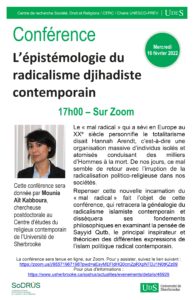 The “radical evil” that plagued Europe in the 20th century personifies totalitarianism, as Hannah Arendt put it, i.e. a massive organization of isolated and atomized individuals leading thousands of people to their deaths. Nowadays, this evil seems to be back with the irruption of political-religious radicalization in our societies. This violent radicalization is disturbing because we have the impression that its structure escapes us: it strikes at an unexpected moment, creating an emotional shock, only to disappear for a while and finally reappear in unforeseeable circumstances. Rethinking this new incarnation of “radical evil” is the subject of this conference, which will trace the genealogy of contemporary Islamist radicalism and dissect its philosophical foundations by examining the thought of Sayyid Qutb, the main inspirer and theorist of the various expressions of contemporary radical political Islam.
The “radical evil” that plagued Europe in the 20th century personifies totalitarianism, as Hannah Arendt put it, i.e. a massive organization of isolated and atomized individuals leading thousands of people to their deaths. Nowadays, this evil seems to be back with the irruption of political-religious radicalization in our societies. This violent radicalization is disturbing because we have the impression that its structure escapes us: it strikes at an unexpected moment, creating an emotional shock, only to disappear for a while and finally reappear in unforeseeable circumstances. Rethinking this new incarnation of “radical evil” is the subject of this conference, which will trace the genealogy of contemporary Islamist radicalism and dissect its philosophical foundations by examining the thought of Sayyid Qutb, the main inspirer and theorist of the various expressions of contemporary radical political Islam.
This conference, jointly organized by the Centre de recherche Société, Droit et Religions, the Centre d’études du religieux contemporain and the UNESCO Chair in the Prevention of Violent Radicalization and Extremism, will be presented by Mounia Aït Kabboura, postdoctoral researcher at the Centre d’études du religieux contemporain of the Université de Sherbrooke.
The event will be held online on Zoom on February 16, 2022, at 5:00 pm (lecture in French)
Article by SODRUS
Crédit Photo: SODRUS/Mounia Aït Kabboura
